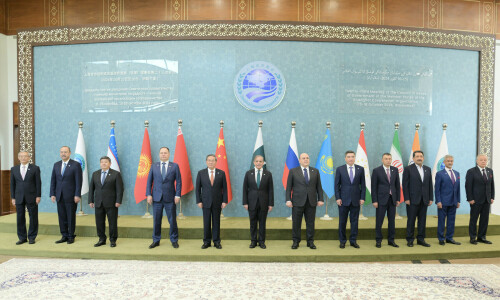The Shanghai Cooperation Organization (SCO) established in 2001, a regional grouping of eight countries comprised of Belarus, China, India, Iran, Kazakhstan, Kyrgyzstan, Pakistan, Russia, Tajikistan, and Uzbekistan, has emerged as a significant player in the world map. With a vast geographical area spanning Eurasia and a diverse range of economies, the SCO offers immense potential for expanding trade and economic cooperation.
SCO region is one of the largest, with a population of 3.5 billion people (40 per cent of the world population), more than $30 trillion GDP (30pc of world GDP) and $2.5tr of trade worldwide. SCO Summits and meetings have always stressed closer connectivity through bilateral trade.
Pakistan currently has vast avenues to approach the SCO markets. The low trade with Iran, Kyrgyzstan, Russia, Tajikistan and Uzbekistan witness vital future trade potential. Pakistan and SCO states have been working to strengthen their bilateral trade relations in recent years.
While their trade volume has not yet reached its full potential, there is significant room for growth in various sectors. The country has potential in areas of energy, gas, agriculture (rice, wheat, pulses, fruits, and vegetables), and defence equipment.
By leveraging its geographical proximity, economic complementarity, and infrastructure development, the SCO can play a significant role in global commerce
China has been a major investor in Pakistan’s infrastructure projects under China Pakistan Economic Corridor (CPEC) with an estimated $60bn. CPEC aims to connect Pakistan’s Gwadar Port to China’s western region. Similarly, China is a major supplier of energy, including coal, oil, renewable energy, and gas. They are working to promote industrial collaboration, with Chinese companies investing in textiles, pharmaceuticals, and electronics. Pakistan also exports agricultural produce to China.
Russia is very keen in Pakistan to participate in highway construction, modern railway development, steel mills, and energy infrastructure projects. On the other side, there is growing cooperation in higher education and R&D, with the exchange of students from both sides sharing and studying in the universities.
The leading challenges between both countries are tariff and non-tariff barriers, lack of market knowledge, and delays in visas and restrictions, but these challenges can be sorted out through bilateral talks, meetings and summits.
Pakistan’s bilateral connections with India and Iran have been a complex issue due to domestic and international strategic, political, and geographical factors, but several persistent efforts have been in place to improve the political and trade relations with both countries. Pakistan has been keen to import natural gas and oil from Iran, whereas India shares a common language and culture, which pave the way for several commodities and services trade.
Pakistan exports textiles, rice, and pharmaceuticals to Kazakhstan and imports oil and gas, machinery and equipment, with a total trade volume of $1 billion. Exports to Kyrgyzstan include textiles, rice, and pharmaceuticals and imports of $200 million of agricultural products, cotton and wheat. Pakistan exports to Tajikistan and Uzbekistan textiles, rice, and pharmaceuticals and imports cotton and wheat, with total trade worth around $100m and $500m, respectively.
Overall, recently, Pakistan’s bilateral trade with Central Asian countries has been on the rise due to several contemporary determinants, including growing regional economic ties led by China, as well as the increasing demand for Pakistani products in Central Asia. The SCO region, especially Russia and Central Asian states, is rich in energy resources, particularly oil and gas.
China, India and Russia are major leaders in the energy trade within the SCO, with significant pipelines and trade routes connecting them to other member states. The region is also a major producer and exporter of industrial goods, including machinery, textiles, and electronics. Trade in these products has been growing steadily in recent years.
The SCO has implemented various economic integration initiatives, such as the Regional Anti-Terrorism Structure (RATS) and the SCO Interbank Cooperation Association (SIBCA), to promote trade and investment.
The SCO member states are geographically located in close proximity, facilitating trade and reducing transportation costs.
The economies of SCO member states are complementary, with each country possessing unique resources and capabilities. This complementarity can create opportunities and potential for mutually beneficial trade. Infrastructure development for regional trade remains a challenge, particularly in some of the more remote areas, due to the Durand line in Afghanistan.
High tariffs, quotas, and other non-tariff barriers hinder the multilateral trade liberalisation process of goods and services. Member states’ economies vary significantly in terms of size, development levels, and economic structures, which may hinder achieving a balanced, bilateral and equitable trade. However, the challenges also witness opportunities for mutual cooperation and development.
The 24th SCO Summit in Islamabad was successfully concluded with eight key agreements signed by the members on security, trade and economic development.
The SCO region is dynamic and growing with immense potential. By leveraging its geographical proximity, economic complementarity, and infrastructure development, the SCO can continue to play a significant role in global commerce. Mutual strategic, political and economic hurdles can be unstiffened for the prosperity of the region.
The writer is an Assistant Professor of economics at NUML, Islamabad
Published in Dawn, The Business and Finance Weekly, October 21st, 2024












































Dear visitor, the comments section is undergoing an overhaul and will return soon.